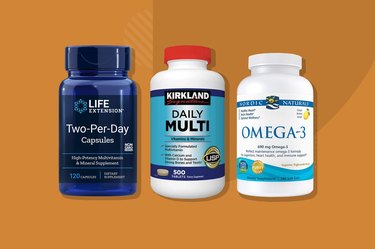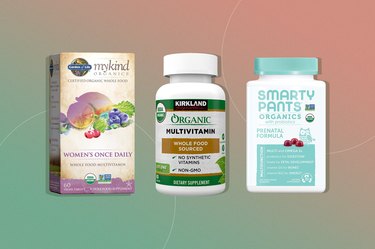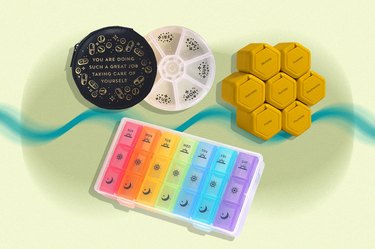
There are many essential nutrients the body needs to function properly. It can be difficult to meet these requirements through diet alone, so supplementing with vitamins may be helpful to prevent nutritional deficiencies.
Choosing the best vitamin and supplement brand is no easy feat, however. The U.S. Food & Drug Administration (FDA) doesn't regulate the vitamin and supplement industry, so they're not all made to the same standard of quality. Plus, some vitamins are absorbed better than others.
Video of the Day
Video of the Day
"Vitamin absorption is the degree to which vitamins from food and supplements get absorbed through the gut and into our bloodstream," explains Jenna Volpe, RDN, a registered dietitian in Austin, Texas. "This is also sometimes referred to as bioavailability."
So, why are some vitamins more bioavailable than others? It comes down to the form of the vitamin, says Volpe.
Still, taking multivitamins and vitamin supplements doesn't replace a nutritious diet. It's unclear if multivitamins are beneficial for nutrient-sufficient individuals, per the Harvard T.H. Chan School of Public Health. And, vitamin supplements can only do so much as the full amount isn't usually absorbed.
"Only about 10 percent of a multivitamin is absorbed when we swallow a tablet or capsule," says William W. Li, MD, a physician and food researcher.
Here, we did the research for you to bring you the best vitamin brands for maximum absorption, to fill in any nutritional gaps.
How We Chose
The FDA doesn't regulate supplements for safety and efficacy, but it does establish Current Good Manufacturing Practices (CGMPs) for supplements, which sets standards for things like quality assurance and cleanliness. It also establishes requirements for manufacturers to verify the purity and strength of supplement products, so consumers know exactly what dosage they're getting and can rest assured that it's free of contaminants.
We spoke to registered dietitians and doctors and included products that adhere to cGMP or have verification from independent quality control organizations, such as:
1. Ortho Molecular
Ortho Molecular is a supplement manufacturer that prioritizes efficacy. It's often used and recommended by healthcare practitioners for its strict quality standards.
"While this line of products is more expensive, they also have some of the highest quality standards I've seen in the supplement industry," Volpe says. "The supplements are third-party tested, and they ensure through lab testing that their products don't contain any harmful ingredients or contaminants."
Some of the brand's products place an emphasis on using ingredients that are best for absorption, such as the form of calcium. Calcium supplements are often used for bone health, but certain types of calcium are poorly absorbed, such as calcium carbonate. Ortho Molecular's Reacted Calcium, for example, uses three forms of calcium, including calcium citrate. This form of calcium, which is used in Ortho Molecular products, is more easily absorbed than calcium carbonate, according to Harvard Health Publishing.
Similarly, Ortho Molecular opts for more easily absorbed forms of magnesium. Magnesium oxide, for example, is known to have poor solubility, according to July 2019 research in Nutrients. Organic magnesium compounds, such as magnesium citrate, are more bioavailable than magnesium oxide, per a January 2017 study in BMC Nutrition. Fortunately, this is the form Ortho Molecular uses in their Reacted Magnesium.
Buy It
- Ortho Molecular Reacted Calcium (Amazon.com, $63.45)
- Ortho Molecular Reacted Magnesium (Amazon.com, $28.99)
- Ortho Molecular Reacted Cal-Mag (Amazon.com, $42)
2. Klaire Labs
Klaire Labs is a science-based manufacturer of vitamin supplements. The Nevada-based laboratory and manufacturing facility is CGMP-compliant, meeting FDA quality standards. The brand is also registered dietitian-approved.
"Klaire Labs uses only natural, activated forms of vitamins in special formula combinations to optimize absorption and overall potency," Volpe says. "For example, they combine vitamin D3 with K2 to optimize absorption for bone health."
It turns out that certain forms of vitamin D and K work synergistically together, and Klaire Labs is aware and mindful of this when making their formulations. Specifically, vitamin D and vitamin K2, when taken together, support bone density mass, according to a September 2017 review in the International Journal of Endocrinology. Researchers also note that the form of vitamin K matters — as Menaquinone-7, the form used in Klaire Labs, is more bioavailable than others.
Volpe particularly recommends their prenatal and nursing formula multivitamins. "They use non-constipating iron, methylated B vitamins and added choline, which isn't found in most other prenatal supplements or multivitamins in general," she says.
Buy It
- Klaire Labs Vitamin D Plus K (Amazon.com, $34.80)
- Klaire Labs Prenatal & Nursing Formula Multivitamin (Amazon.com, $35.99)
- Klaire Labs Multi-Vitamin Complex (Amazon.com, $24.49)
3. Seeking Health
Founded by a physician, Seeking Health manufacturers vitamin supplements in line with strict quality standards. The company is CGMP-certified in accordance with FDA standards for quality assurance.
"Seeking Health uses only high-quality, natural, activated and bioavailable forms of vitamins based on cutting-edge research," Volpe says, adding that third-party testing is used to ensure that products are free of harmful contaminants.
To ensure the absorption of its products, Seeking Health uses forms of nutrients that are more bioavailable as well as pairs certain nutrients together to encourage absorption. In its Chewable Iron, Seeking Health uses ferric glycinate, a well-tolerated and bioavailable form of non-heme iron. It's also paired with vitamin C to boost absorption.
Vitamin C is the only nutrient that has been shown to increase the absorption of iron, according to a November 2020 trial in JAMA. "Iron supplements and plant-based food sources of iron are a non-heme form of iron," Volpe says. "Vitamin C helps to convert this to heme iron, which is the only usable form of iron for our body."
In its Optimal Multivitamin Plus, the brand sticks to bioavailable forms of important nutrients like folate and vitamin B12. Its multivitamin uses Quatrefolic, a form of folate that's 9.7 times more bioavailable than folic acid, per an April 2016 animal study in Minerva Ginecol. Similarly, it uses methylcobalamin, the metabolically active form of vitamin B12, per the National Institutes of Health.
Buy It
- Seeking Health Optimal Multivitamin Chewable (Amazon.com, $29.95)
- Seeking Health Kid's Optimal Multivitamin (Amazon.com, $31.30)
- Seeking Health Optimal Multivitamin Plus (Amazon.com, $69.30)
4. Thorne
Supplement manufacturer Thorne is a trusted name in the vitamins industry. Its products have been used in more than 40 clinical trials and medical research, and its facilities are CGMP-compliant.
What's more, the products are NSF-Certified for Sports, so they're often used by athletes. This means its products are free of more than 200 substances that are banned by sports organizations.
Its many certifications include an A rating from Australia's Therapeutic Goods Administration (TGA), which isn't to be taken likely. TGA certifications are hard to come by in the United States, and Thorne is one of the few U.S. brands to accomplish this.
Thorne sources high-quality ingredients — especially those with a track record of high absorption. While some brands conduct in-house testing once or twice, Thorne products undergo four rounds of testing to eliminate contaminants, check for defects, test for potency and purity and ensure stability.
And bioavailability is critical to Thorne. Its Basic Nutrients 2/Day is formulated with the most bioavailable forms of nutrients, such as the highly absorbable form of zinc, Zinc bisglycinate. Zinc glycinate has been shown to be more effective at raising zinc levels than other forms, according to a November 2015 study in Biological Trace Element Research.
Buy It
- Thorne Basic Nutrients 2/Day (Amazon.com, $27)
- Thorne Basic Prenatal (Amazon.com, $26.10)
- Thorne Women's Multi 50+ (Amazon.com, $41.40)
5. Solaray
Solaray is a supplement brand you're likely to find in your local health food stores. It's been around for more than 50 years and has stood the test of time. "Solaray products are made in the United States, and the brand tests their raw materials and finished products for purity, authenticity and potency at their certified cGMP facility," says integrative physician Pamela Peeke, MD.
Peeke particularly recommends Solaray's liposomal multivitamins for their absorption. "Liposomal vitamins, as well as chelated minerals, are believed to deliver greater absorption based on clinical research," she explains. "Liposomes are already in a 'transporter' ready for uptake."
The research on liposomal vitamins is promising. One of the advantages of liposomal vitamins is their high bioavailability and absorption, per a March 2016 review in Integrative Medicine: A Clinician's Journal. Liposomal vitamin C, for example, produces higher concentrations of vitamin C in the body than other oral forms, according to June 2016 research in Nutrition and Metabolic Insights.
Buy It
- Solaray Liposomal Multivitamin Women’s (Amazon.com, $44.99)
- Solaray Once Daily Adult 50+ Multivitamin (Amazon.com, $21.99)
- Solaray Spectro Man Multivitamin (Amazon.com, $27.49)
What to Look For Before Buying
Quality
When choosing a supplement brand, Volpe says quality is a top criterion. "It's everything," she exclaims.
Quality refers to the type of ingredients used and the manufacturing process. Look for brands that share how their vitamins are sourced and the type of laboratories used to manufacture them.
Third-Party Testing and Certifications
"Many vitamin supplements on the market are very cheap, synthetic and possibly even contaminated with toxins and heavy metals since this industry is not regulated by the FDA," says Volpe.
Third-party testing from independent organizations like USP gives consumers a little peace of mind that their supplements are made with quality ingredients and contain the labeled potency.
Allergens
An estimated 11 percent of U.S. adults have food allergies, according to the Asthma and Allergy Foundation of America. Nine allergens — milk, soy, eggs, wheat, peanuts, tree nuts, sesame, fish and shellfish — are the most common to cause reactions.
Some vitamin supplements contain food allergens, use allergen-derived ingredients or are manufactured on shared equipment. If you experience food allergies, look for brands that are free of allergens and aren't exposed to allergens through cross-contamination.
How to Absorb Vitamins Better
Volpe recommends the following tips to get the most absorption out of your vitamins:
- Take fat-soluble vitamins A, D, E and K with a food source of fat.
- Take iron supplements with vitamin C.
- Avoid taking iron and calcium at the same time.
- Keep your levels of vitamin D healthy to absorb calcium better.
- Work with your doctor if health issues, such as low stomach acid, interfere with vitamin absorption.
Ultimately, science doesn't tell us everything we need to know about vitamin absorption.
To err on the side of caution, be sure to consult your doctor before taking any new vitamins or supplements.
"Not everyone benefits from taking vitamin supplements, and they should never replace a balanced diet," Volpe says, so checking with a healthcare professional first is usually your best bet.
- Frontiers in Nutrition: "Bioavailability of Micronutrients From Nutrient-Dense Whole Foods: Zooming in on Dairy, Vegetables, and Fruits"
- U.S. Food & Drug Administration: "FDA 101: Dietary Supplements"
- FDA: "Current Good Manufacturing Practices (CGMPs) for Dietary Supplements"
- Harvard Health Publishing: “Choosing a calcium supplement"
- Nutrients: "Predicting and Testing Bioavailability of Magnesium Supplements"
- BMC Nutrition: "Higher bioavailability of magnesium citrate as compared to magnesium oxide shown by evaluation of urinary excretion and serum levels after single-dose administration in a randomized cross-over study"
- JAMA: "The Efficacy and Safety of Vitamin C for Iron Supplementation in Adult Patients With Iron Deficiency Anemia: A Randomized Clinical Trial"
- Minerva Ginecol: "Enhanced oral bioavailability of a novel folate salt: comparison with folic acid and a calcium folate salt in a pharmacokinetic study in rats"
- National Institutes of Health: "Vitamin B12 Fact Sheet for Health Professionals"
- Harvard T.H. Chan School of Public Health: "Should I Take a Daily Multivitamin?"
- Biological Trace Element Research: "Moderately High Dose Zinc Gluconate or Zinc Glycinate: Effects on Plasma Zinc and Erythrocyte Superoxide Dismutase Activities in Young Adult Women"
- Asthma and Allergy Foundation of America: "Allergy Facts and Figures"
- Nutrition and Metabolic Insights: "Liposomal-encapsulated Ascorbic Acid: Influence on Vitamin C Bioavailability and Capacity to Protect Against Ischemia–Reperfusion Injury"
- Integrative Medicine: A Clinician’s Journal: "Liposomes as Advanced Delivery Systems for Nutraceuticals"


